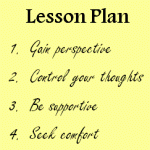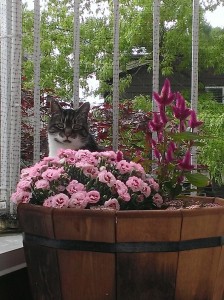Hard Lessons
These are lessons I didn’t want to learn. If the tradeoff was having Milo with me or knowing what I know now? I’d pick my cat. Of course I would.
But life doesn’t work that way, so I figure that the only thing worse that losing him would be to not learn anything from it.
The first lesson came when my cat started showing symptoms that were later diagnosed as thyroid disease and lymphoma. I fell apart every day. Sometimes multiple times in a day. By falling apart I mean crying, and moments where my energy drained out of me and all I wanted to do was lay down.
Then I decided that I didn’t want to live like that anymore. With chemotherapy and his other medicines, it was possible that he would have lived for up to three more years and I didn’t want to be depressed that entire time. I made a choice not to make his illness the center of my life. I had a book to finish, relationships to care for and work to do. When he died, that choice became not making his death the center of my life.
The second lesson I learned is that I can control my thoughts. We hear a lot about this – the power of positive thinking, we create our own realities, blah blah. At different times in my life I have tried to consciously choose my thoughts but it wasn’t that effective. I also had some scorn about people trying to brainwash themselves into believing they were better off than they actually were. It seemed unauthentic.
Soon after Milo died, I felt a tremendous sense of guilt and regret. Not about euthanasia at the end. I regretted that I hadn’t rushed him to the ER sooner after he started going downhill the last time. He stopped eating and drinking and I waited, thinking about how stressful the hospital was and how much he hated it. I waited, wondering if would be better to let him die at home than put him through more intervention. I waited, asking myself how many times we were going to do this. Then the decision got past me, and by the time I took him to get fluids, it was a hospice mission.
After he was gone, I wished I could go back in time and make a different choice. I kept thinking, “if only I had taken him to the hospital sooner, would he still be alive?” These thoughts were so painful that I had to stop them. I realized that they didn’t serve me – they only caused me to suffer, and they didn’t honor Milo’s life. I made myself acknowledge that there is no way of knowing if he would have lived longer, and that thinking I made the wrong choices was just one story. Another story is that I did the right thing. Possibly more treatment would have been worse for him, or he might have died there, in the place he hated, away from me.
The “if only” thoughts still came, but when they did, I forcibly stopped them. As soon as I caught myself, I would think, “NO!” And then tell myself, “I choose to believe the possibility that I made the right choices.” At first this scenario played out repeatedly. After a while, less so.
The third lesson was that the support I received taught me how to support others in grief. One friend called me the evening that Milo passed away, and just listened. She invited me to go out the next night, and getting out and doing something helped. Another friend came to my house the next day with a plant, and the formalness of it made me feel like we were memorializing Milo. Receiving cards and reading messages from people on Facebook also helped.
In the past, I wasn’t always one to reach out when someone else experienced a loss. I might have been unsure if making contact was welcome. What if they wanted to be alone with their grief? Or I felt unsure of what to say and then didn’t reach out at all. After being comforted by other people’s gestures, I decided that even if I didn’t know what that person wanted, it is better to send an email, a text or make a phone call than not.
The last lesson I’ve learned is to look for support and comfort. Besides accepting help from my friends and family, I took action on my own. I read articles online about grieving animal companions, and found a weekly candle lighting ceremony at www.petloss.com. Each Monday, people across the globe gather online to read a prayer for our animals and light candles to honor them. When the ceremony isn’t taking place, people can use the chat room to seek support from each other.
A few days ago, a blog that I subscribe to included a post called Moving Beyond the Pain of Losing Someone You Love. The author, Karen Lang, wrote about the tragic loss of her son and how for a period of time she doubted the choices she made at the end of his life and was consumed with wondering “what if”. Although our losses are different, she expressed what I had been feeling and that was reassuring.
I also happened to get an email with a link to a podcast that featured Christina Rasmussen, who wrote a book called Second Firsts: Live, Laugh, and Love Again. Normally I have no patience for podcasts, but I listened to this one twice. She uses science to support her theories and talked about the importance of giving ourselves time to rest and recover when we’re hurt: she calls this “the waiting room”.
No matter what I have going on in my life, I feel self-imposed pressure to complete my self-imposed deadlines for work and writing. When I take breaks or try to get extra rest, I often wind up feeling more anxious instead of energized. Rasmussen’s message pointed out that allowing myself downtime is more helpful than slogging through my to-do list.
None of these lessons are worth what I lost. But they’re better than not learning anything at all.



Recent Comments